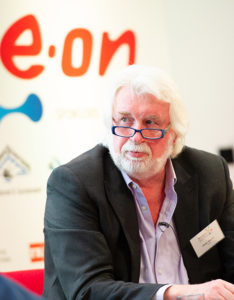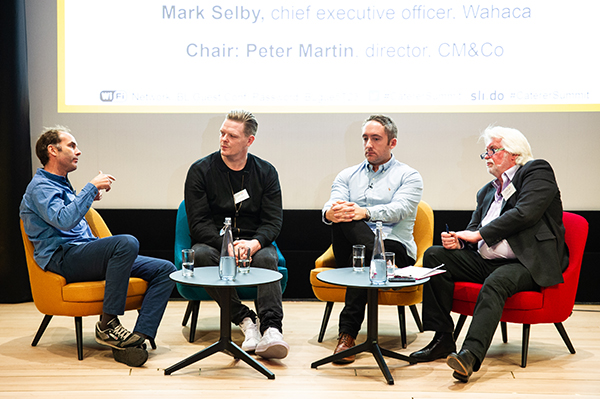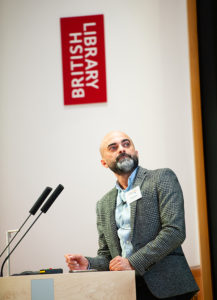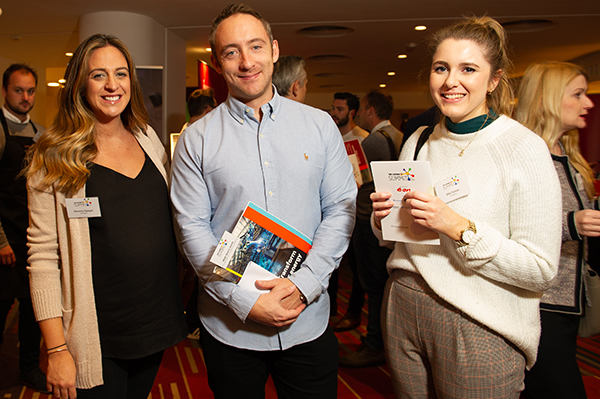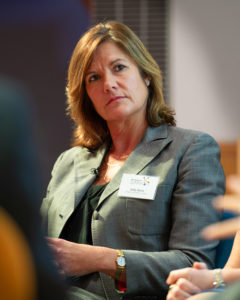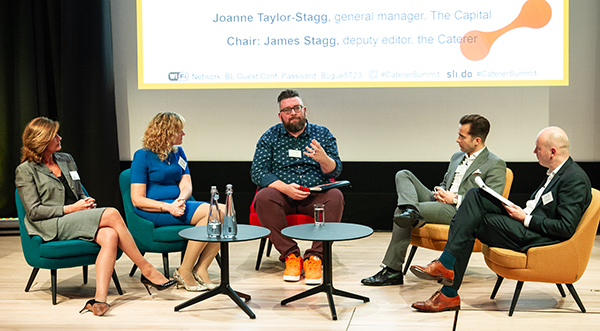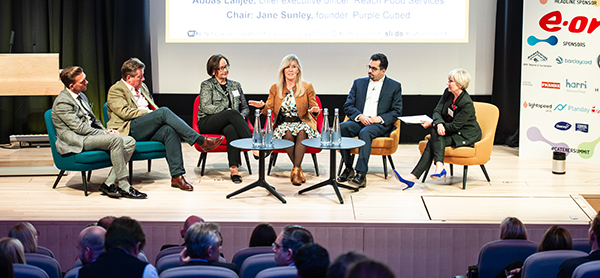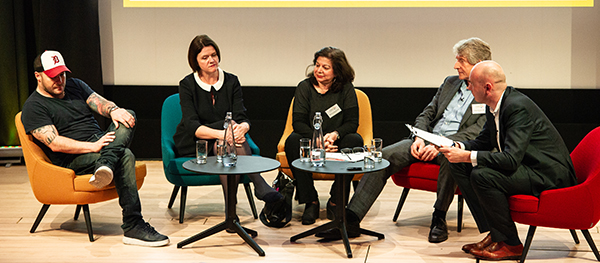Meet the experts: The Caterer Summit
Last week leaders from across the hospitality industry met at The Caterer Summit to discuss the problems affecting operators and the best strategies for moving forward. Janie Manzoori-Stamford reports
*T*he Caterer Summit, held last week at the British Library in London, brought together leaders from across the hospitality spectrum to delve deep into the machinations of the five moving parts of every business in the sector: people, product, property, debt and marketing.
Street food entrepreneur Jonathan Downey, celebrated chef Tom Kerridge, and hotelier Gareth Banner were among the line-up to share business advice and inspiration based on their own success stories.
A new night out
"We are not a food hall." Jonathan Downey, the creative mind and energy behind the £13m Street Feast business, was very firm about that when he shared the secrets behind his mission to create a new night out.
The food hall business that is making waves in the US, with the likes of Reliance in Chicago and Urban Space in Manhattan, has yet to find its feet this side of the Atlantic, Downey explained. And US food halls tend to be daytime-only operations.
"My business takes care of the night time most. That's when most of the drinking is done and that's when most of our money is made: 80% of our revenue comes from bar sales," he said.
Downey founded Street Feast three years ago in partnership with Henry Dimbleby, and the concept's creation of a "new night out" was somewhat accidental, he said. It was launched on the principles of bars, street food, music and people.
"What we tried to do was offer a really wide variety of food and drink. Across our group of five sites we have 40 kitchens and 35 bars."
Downey described the typical Street Feast audience, of which 70% is aged between 18 and 34, as food-forward, socially 'uber-active' experience hunters who socialise en masse, but added that they are also not very loyal.
"Even though we create an incredible night out for them at Dinerama in Shoreditch, for example, they probably only comes to us four or five times a year. On some evenings, 80% of the thousands of people we get are new to the venue," said Downey. "We are always thinking about what's now, what's new and what's next, and that is what is being demanded of us by our audience."
Nailing your offer
"If you can build loyalty, it's a good backbone. Build loyalty with value for money and give people a lot for what they're willing to pay. And then it's about experience and creating that vibe," said JJ Goodman, founder and owner of London Cocktail Club. "Product doesn't define even half of the experience. I'd argue it's 25%. We push our staff to build great energy and have fun. Value for money creates repeat business, which is the only thing that operators should focus on to find success."
The discussion then moved on to changing trends, and how much attention operators should pay them. Matt Grech-Smith, co-founder and managing director of the Institute of Competitive Socialising, doesn't think they should take precedence: "It's about finding the right things that work within your experience. You don't necessarily want to change things intrinsically so the next time people come in they have a completely different experience.
"But do keep one eye out for new things. We put a 3D photo podium in our West End Swingers venue. It gets used 15,000 times every three months and we collect all the email addresses from people sending the photos to themselves they must opt-in]. It fits in with our operation, people actually want it and we get something out of it as well."
Mark Selby, chief executive officer at Wahaca, explained his strategy: "Our big thing now is driving consistency. We've got 25 restaurants and a mission to get people loving tacos on a regular basis.
"When we first started, it was very much an experience. We're trying to encourage people to come in for their pork pibil or plantain tacos on a regular basis, while also throwing in lots of development work to create an element of the menu that continues to evolve and appeal to foodies."
Charging ahead
"We are starting to get many enquiries from hospitality businesses because their own customers are asking about charging their cars," he said. "It's a mega-trend we're not going to get away from."
In 2013, analysts estimated that the number of electric vehicles on the road by 2030 would reach one million. But the latest forecast has put that figure closer to 11 million, Rana revealed. Yet despite the anticipated surge in demand, 48% of businesses have not yet considered installing charge points.
"Over next few years, demand for EV charging will increase substantially," Rana said. "But the challenge comes the later you leave it. In areas where people have already installed charge points and where grid capacity is constrained, your business will potentially be locked out from providing a service that your customers want."
Creating communities
The Caterer's expert panel provided some innovative strategies for connecting with your customers and ideas to help you stand out from your competitors.
Mark McCulloch, founder and chief executive of We Are Spectacular, said: "Look at the more taboo industries like porn and gambling - all as research - these are the innovators. Look firmly outside the hospitality industry at the ones that have got it so right, digitally and messaging-wise. They can take your money within a second. Steal shamelessly from aggregator sites such as Netflix and Airbnb as your first step and then see if you can leapfrog them and improve on it."
An audience with Tom Kerridge 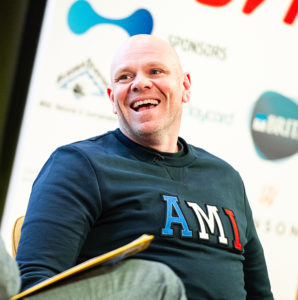"It's hospitality. Aren't we all the same?" asked celebrated chef Tom Kerridge, who in September launched Kerridge's Bar & Grill at the Corinthia Hotel London to instant critical success. *The Caterer* editor Chris Gamm had enquired about the differences between operating at a five-star hotel in the capital and a Buckinghamshire pub. According to Kerridge, they both come down to the same basic ingredients. "Try and find the best produce you can for your offer, make sure people know you're there, and when they come through the door, you smile and say hello to make them feel welcome. You sit them down, you give them food and drink, then they leave and they give you money," he explained, smiling. "It works. It's a very simple business and sometimes we hospitality operators over-complicate it for ourselves. We become too involved in a concept, a dream or an idea, but at the end of the day, a guest is coming to have a nice time." Running a London restaurant is very complicated, he added, and being in a five-star hotel comes with increased visibility and a broader remit, but the end result is very similar to what he and his team deliver at his two-Michelin-starred Marlow pub, the Hand & Flowers. Kerridge admitted that running a business empire that today includes restaurants, television, books and music festivals, comes with a "massive amount" of pressure, but added that he tries not to overthink it. "Sometimes you have bad days," he said. "Other days it's really cool, like when you're hanging with Nancy Cartwright. You run a restaurant and you meet Bart Simpson. That's quite cool!" 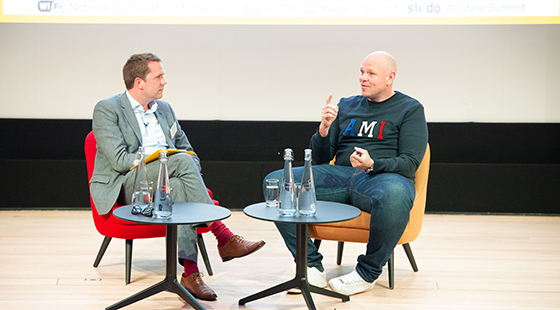 [Urban legend: Jonathan Downey, the man behind Street Feast, on bringing quality dining to derelict London >>](/articles/533463/urban-legend-jonathan-downey-the-man-behind-street-feast-on-bringing-quality-dining-to-derelict-london) [Kerridge's Bar & Grill at the Corinthia: Thomas Kochs and Tom Kerridge reveal the secret to a perfect partnership >>](/articles/537472/kerridges-bar-grill-at-the-corinthia-thomas-kochs-and-tom-kerridge-reveal-the-secret-to-a-perfect-partnership) [Get The Caterer every week on your smartphone, tablet, or even in good old-fashioned hard copy (or all three!).
Continue reading
You need to be a premium member to view this. Subscribe from just 99p per week.
Already subscribed? Log In





